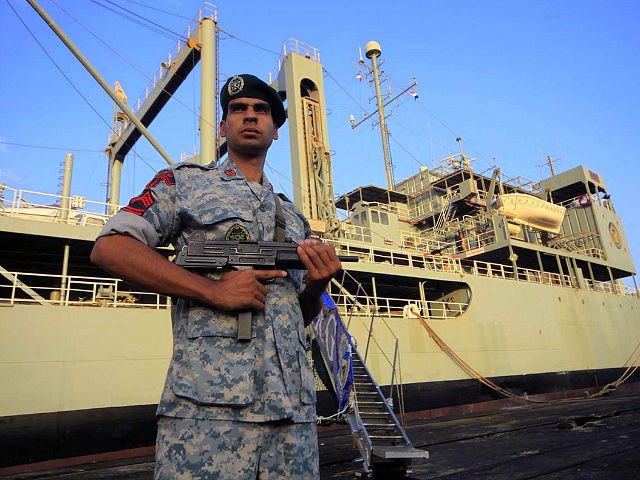On Tuesday, the aircraft carrier USS George W. Bush entered the Strait of Hormuz from the Indian Ocean, a vital waterway that handles about 30 percent of the world’s oil shipping. As it has done so often over the past few years, Iran sent a swarm of speedboats to harass the carrier.
“What reason were they to be in an international corridor, other than to harass us? Was today the day they were going to come out and potentially deploy kinetic actions against us?” asked Rear Admiral Kenneth Whitesell, commander of Carrier Strike Group 2, as reported by Japan Times.
Captain Will Pennington of the George W. Bush said the U.S. Navy changed its security procedures after a Saudi ship was attacked off the coast of Yemen by what some describe as a “drone” boat, roughly comparable in size to the Iranian Revolutionary Guard Corps patrol boats.
“Some of our escort ships arrived in advance of us and provided security in that Bab al-Mandeb and a few lagged a few days behind so our coverage of that area was extended. That same threat could exist here in the Strait of Hormuz or any other strait,” Capt. Pennington explained.
Japan Times adds the detail that the crew of the aircraft carrier was playing a Rihanna song over the loudspeakers on deck when the Iranian boats appeared, obliging the sailors to cut off the music and get busy. The Iranian flotilla reportedly consisted of about twenty small vessels, some of which came within a thousand yards of the George W. Bush. Several U.S. helicopters were launched to monitor the Iranians.
Whitesell rated the danger level of the encounter as “7.5 out of 10,” noting the Iranians had “every one of those weapons manned,” and the Navy has video data to prove it. He had to break off his on-deck interview with journalists and return to the bridge because more Iranian boats were detected approaching the carrier.
“The number one thing that bothers me is they [the Iranian vessels] had their weapons uncovered. The second thing that bothers me is that they had their weapons manned. And the third thing… is they were loading their weapons while they were rendezvousing us and they were coming right after us,” The National quotes Whitesell saying.
“It’s unprofessional behavior, it’s harassment behavior and it’s something you wouldn’t expect when you’ve got a hundred giant vessels per day going through the Strait of Hormuz, and – at least from the flow of oil – the most critical strait in the world,” Whitesell said. “This is their routine behavior, which in any other area of the world, any other maritime environment, this would be seen as a violation of international law.”
Captain Pennington added that Iranian “instability and lack of predictability” was the major security threat to the Gulf region, including “Iranian-sponsored activity” from the Houthi militants in Yemen.
Pennington told Reuters the Iranians have “every right to come out and see who we are and query what our intentions are,” but their methods are “unprofessional and add greater risk to a miscalculation in our need to maneuver the ship, and often presents a risk to the merchant traffic that’s around us.”
“I would say that approaching at a high rate of speed while loading your weapon and while essentially threatening a helicopter that is part of our group while we are behaving completely in line with international law… I wouldn’t call it a grave threat, that would be an overstatement, but it is certainly unprofessional behavior,” Pennington said.

COMMENTS
Please let us know if you're having issues with commenting.